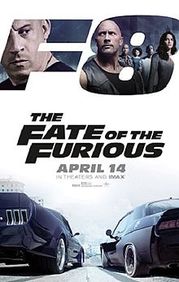 First of all, hello to all the new people who discovered us at the Calgary Comic Expo! Or, if you’re a regular reader and would like to visit us this weekend, we’re in booth 4540 in the Big Four building. We hope to see you stop by! Okay, article time. So, I just got home from seeing The Fate of the Furious. This isn’t a review of that – if you liked the last seven of them you’ll like the eighth one, that’s all there is to that. What I want to talk about instead is one of the positives of the writing of the, uh, “and Furious” franchise. To a lot of people those are pretty few and far between, so I think it’s only fair to point out when they do something really really correct. As far as I know there isn’t really a concrete term for what I’m describing, so for the purposes of this article we’re going to talk about this in terms of thematic resonance, or how strongly you relate to the subtext presented in a work. This ties very strongly into my previous article, “On Subjectivity.” (Funnily enough, after writing that article, Greg said it was one of the best articles I’d ever written, while I think that some of my earlier stuff is a little better.) The short definition is this: You’re gonna like stuff that hits you in the feelings more than stuff that doesn’t. This is not surprising. If that’s surprising to you, it’s possible that you’ve never actually seen a movie before. But it does explain a lot of stuff. I have an excellent case study for exactly this topic: From the opposite side of the equation this is called “knowing your audience.” Knowing your audience doesn’t guarantee a good movie, but it does typically guarantee a profitable movie. The Fast and the Furious movies know their audience perhaps better than everyone except one filmmaker on the planet: Michael Bay. There are a lot of people, myself included, who shit on Michael Bay pretty relentlessly. For one thing, he wrecked the Transformers franchise for me, and while they were better than that, he also fucked with Teenage Mutant Ninja Turtles, which gives him two strikes in my nerd culture book. Yet the Transformers films have grossed almost $3.8 billion over the course of their lifetime. Despite having an 18% rating on Rotten Tomatoes, the oft-forgotten Age of Extinction grossed over a billion dollars on its own. Handily. Why? Because Michael Bay knows his audience. The man is your go-to summer blockbuster guy. Michael Bay isn’t winning any Oscars because he’s not going for Oscars – he’s going for the kind of popcorn flicks that get butts in seats when kids are off school in July. It doesn’t matter how poorly his films are received for being trite and explosion-y because his target audience is looking for a trite movie that’s full of explosions. It’s easy to dismiss Michael Bay as someone who doesn’t know how to make movies. It’s an extremely tempting notion because it lets us disregard him without having to think too hard. But the man knows what he’s doing, both as a marketer and as a student of the craft of film. His shots are well crafted, and on the occasional time that he’s delved into something slightly deeper than a rain puddle (The Rock, for instance) he’s shown he has a strong understanding of visual storytelling. That means that he’s making lowest-common-denominator action films on purpose. Why? Say it with me now. Because the man knows his audience. Fate of the Furious does something similar, both in terms of plot and in terms of what I was alluding to earlier—theme. The series plays on extremely universal and wide-reaching thematic beats: Fraternity, loyalty, self-determination, etc. These things synergize very naturally with the hyper-machismo aesthetic of the films to make them extremely appealing to a large male audience.  Much like my subjectivity article, I’m not immune to this. I fucking love the Fast and the Furious series. It’s ridiculous, but it’s the fun kind of ridiculous that tickles my inner five-year-old that just wants to see explosions and attractive people and shiny stuff moving really fast. On the other hand, I don’t love this series even a fraction as much as Greg does. Greg really loves the movies because, and I’m quoting here, they’re “ABOUT FAMILY!” And this is the thing I’m talking about; family is super important to Greg, and so laying that theme on thickly (and it’s thick in this latest installment) gives the film, to him, a sense of substance that might not necessarily extend to all members of the audience. It’s part of the reason that I love The New Guy, it’s a movie about coming into your own from a position of social ostracism, which really resonated with me when, y’know, I was an enormously antisocial outcast, and fantasies of dramatic change were really valuable to me at the time. I want to tie this back into subjectivity, because I feel like in my last article on the subject I failed to talk about every facet of it that I wanted to. Subjectivity isn’t something that just comes, poof, out of thin air. We’ve all got this unconscious list of boxes that need to be ticked in order for us to like something, and all of that stems from our personal experiences and values. Greg values the Fate of the Furious aesthetic because his family life has always been one that valued loyalty to the brotherhood very strongly. It’s the same reason why Final Fantasy XV resonated so strongly with him. As someone who didn’t have that experience growing up, I’m more willing to be critical to things that lean hard on those themes. Subjectivity doesn’t just get pulled out of your ass, it’s a combination of the experiences you’ve had and the choices you’ve made that lead you to be the person that you are now.
Sometimes those choices lead you to like The Fate of the Furious. It’s all good.
0 Comments
Leave a Reply. |
Author
Scott Watmough has many strong opinions about many things that he knows very little about. They're usually about video games. Archives
March 2018
Categories |

 RSS Feed
RSS Feed
